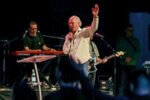
[09.19.08] Baylor University’s Institute for Studies on Religion (ISR)
released a survey Thursday that concluded surprising results about the American
religious landscape. In a follow-up to the school’s 2005 survey on religion,
which found that most Americans believe in God or a higher power, researchers
sought to delve deeper into Americans’ beliefs.
released a survey Thursday that concluded surprising results about the American
religious landscape. In a follow-up to the school’s 2005 survey on religion,
which found that most Americans believe in God or a higher power, researchers
sought to delve deeper into Americans’ beliefs.
“Our mission with the Baylor Religion Survey [was] to ask deeper
questions,” said Christopher Bader, an associate professor of sociology at
Baylor and one of the ISR researchers. “Lots of surveys ask: ‘Do you pray and
how often?’ Very few surveys ask what you pray about. A lot of surveys ask: ‘Do
you believe in God?’ But surveys have not asked who is God.
questions,” said Christopher Bader, an associate professor of sociology at
Baylor and one of the ISR researchers. “Lots of surveys ask: ‘Do you pray and
how often?’ Very few surveys ask what you pray about. A lot of surveys ask: ‘Do
you believe in God?’ But surveys have not asked who is God.
“The idea was to take every question you usually see on a religion survey
and try to push it several levels.”
and try to push it several levels.”
Conducted by the Gallup Organization on 1,648 random American adults, the
study found that contrary to common opinion, megachurches have more intimate
relationships among congregants then do smaller congregations.
study found that contrary to common opinion, megachurches have more intimate
relationships among congregants then do smaller congregations.
“None of the things we all believe about the megachurch is true,” said
Rodney Stark, professor of social sciences at Baylor and co-director of the ISR.
Rodney Stark, professor of social sciences at Baylor and co-director of the ISR.
Megachurch constituents tend to show more commitment to their churches by
attending Bible studies and weekly services, as well as tithing more
consistently, than their smaller counterparts. People attending churches with
more than 1,000 members are also involved outside the church—often active in
home Bible studies and inviting more friends and family to church.
attending Bible studies and weekly services, as well as tithing more
consistently, than their smaller counterparts. People attending churches with
more than 1,000 members are also involved outside the church—often active in
home Bible studies and inviting more friends and family to church.
“We think of [megachurches] as these great, huge, cold religious gatherings
with a symphony orchestra and a paid choir and a lot of hoopla and a lot of good
tidings but no bad tidings,” Stark said. “It’s not true that it’s all happy
talk. These people are as interested in evil and sin as anybody in any of the
churches. Their levels of satisfaction are high, their volunteerism in community
service is very high and their outreach efforts are absolutely phenomenal.”
with a symphony orchestra and a paid choir and a lot of hoopla and a lot of good
tidings but no bad tidings,” Stark said. “It’s not true that it’s all happy
talk. These people are as interested in evil and sin as anybody in any of the
churches. Their levels of satisfaction are high, their volunteerism in community
service is very high and their outreach efforts are absolutely phenomenal.”
Results from the study, which were announced in the nation’s capital and is
published in What Americans Really Believe by Rodney Stark, found that
despite recent reports Americans have not become disenfranchised with organized
religion. An estimated 31 million people participate in community outreaches
such as neighborhood prayer meetings and Bible studies affiliated with a church.
published in What Americans Really Believe by Rodney Stark, found that
despite recent reports Americans have not become disenfranchised with organized
religion. An estimated 31 million people participate in community outreaches
such as neighborhood prayer meetings and Bible studies affiliated with a church.
“One of the things that you hear a lot of is that people are growing
dissatisfied with organized religion, and because of this dissatisfaction, they
don’t participate in religious activities,” said Byron Johnson, professor of
sociology at Baylor and co-director of the ISR. “What we found [is] that people
who do these outreach ministries all operate from the base of some organized
church that they’re involved in. They’re really not out there frustrated with
the organized church doing these other kinds of ministries and outreach that
they have no church home of their own because they’re so dissatisfied. It’s not
true.”
dissatisfied with organized religion, and because of this dissatisfaction, they
don’t participate in religious activities,” said Byron Johnson, professor of
sociology at Baylor and co-director of the ISR. “What we found [is] that people
who do these outreach ministries all operate from the base of some organized
church that they’re involved in. They’re really not out there frustrated with
the organized church doing these other kinds of ministries and outreach that
they have no church home of their own because they’re so dissatisfied. It’s not
true.”
With the emergence of atheistic best-selling books such as The God
Delusion, some have claimed atheism is on the rise in America. But the ISR
report refutes this assertion. The research showed atheism has remained a steady
4 percent of the U.S. population since the mid-20th century and that atheists,
as a group, tend to be avid readers, which might explain why recent atheistic
books sold so well.
Delusion, some have claimed atheism is on the rise in America. But the ISR
report refutes this assertion. The research showed atheism has remained a steady
4 percent of the U.S. population since the mid-20th century and that atheists,
as a group, tend to be avid readers, which might explain why recent atheistic
books sold so well.
Other findings found that 55 percent of Americans have had specific
spiritual experiences, including hearing God’s voice, feeling God’s directional
leading, speaking or praying in tongues, being protected by an angel, and
witnessing or receiving a miracle healing.
spiritual experiences, including hearing God’s voice, feeling God’s directional
leading, speaking or praying in tongues, being protected by an angel, and
witnessing or receiving a miracle healing.
Forty-five percent of respondents said they’d had at least two religious
experiences. Women, African-Americans and Republicans charted the highest
numbers in this category.
experiences. Women, African-Americans and Republicans charted the highest
numbers in this category.
Sixty-seven percent of Americans said heaven “absolutely” exists and 73
percent said hell exists.
percent said hell exists.
The study is the second of a series of religious research that will
continue to be conducted every two years by the ISR until 2018.
continue to be conducted every two years by the ISR until 2018.
“In the future we’ll be able to see a trend of what religion is doing in
this country over the course of 20 years in a very deep sense,” Bader concluded.
—Felicia Mann
this country over the course of 20 years in a very deep sense,” Bader concluded.
—Felicia Mann





Leave a Comment
You must be logged in to post a comment.